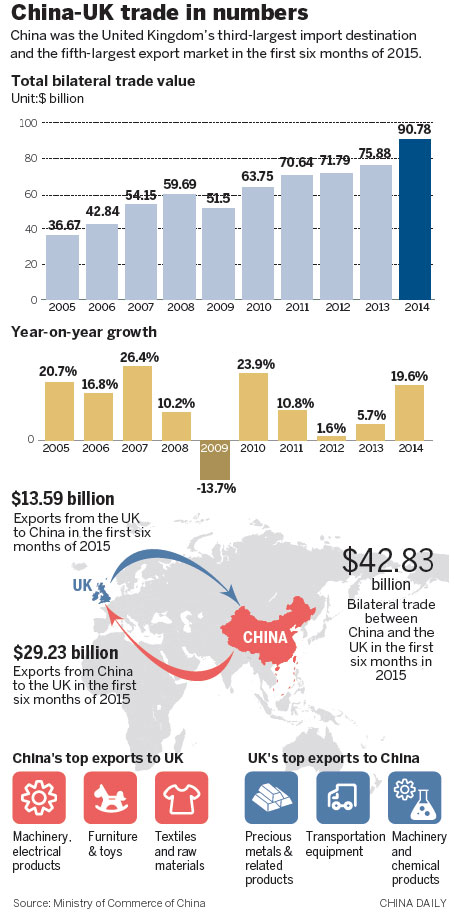Close nuclear ties will benefit China
Updated: 2015-10-22 07:40
By Lyu Chang(China Daily)
|
|||||||||||
Exporting homegrown nuclear reactors will no longer be out of reach, as Chinese nuclear powerhouses sealed deals to invest in what will be the first nuclear power plant in the United Kingdom in a generation on Wednesday, providing a foundation for future nuclear cooperation.
Chinese companies, led by China General Nuclear Power Corp, will hold 33.5 percent of shares of Hinkley Point C facility on Britain's northern Somerset coast through an investment from its British company called General Nuclear International, according to a statement by CGN.
The project - a two-reactor, 3.2-GW station - will be built by French power giant Electricite de France SA and the Chinese consortium.
The statement said EDF, which holds the majority stake in the project, intended to invite other investors for the HPC project.
The other two nuclear power stations, which also include Chinese participation, are Sizewell C in Suffolk, and Bradwell B in Essex, it said.
CGN will take 66.5 percent, a controlling stake in Brad-well B project, with EDF holding 33.5 percent. As for Sizewell C, EDF will hold 80 percent with CGN holding the rest.
The project of Bradwell B will be using China homegrown third-generation nuclear technology known as Hualong One, after the technology passes general design review by the UK.
Zhao Chengkun, vice chairman of the China Nuclear Energy Association, said the Chinese participation mainly focuses on the nuclear investment, but the experience will be a learning process for the next nuclear facility, which Chinese entities may be able to design, manage and operate.
"The UK nuclear market is very complicated, with many different standards and regulations to meet," he said. "HPC is only a starting point."
Zhao, also former head of the National Nuclear Safety Administration, said most of the UK's nuclear power plants were built in the 1970s and 1980s and need to be replaced in the next decades, giving a huge opportunity for Chinese engagement in nuclear technology, construction and even operation.
The UK, as an early nuclear country, has expertise in waste management and decommissioning that China can learn from, Zhao said.
However, hurdles still exist with unfamiliar nuclear regulations and safety requirements in different countries. Zhao said the Chinese consortium will need to team up with its foreign counterparts and develop its international expertise through collaboration.
To better serve the UK nuclear market, manufacturers in the Chinese industry are expanding their presence in the country.
GNI was set up by CGN on Monday in London, focusing its business to promote the company's nuclear power projects in Britain.
China National Nuclear Corp, another Chinese nuclear giant, signed an agreement to jointly lead the new UK-China Joint Research and Innovation Centre with the UK's National Nuclear Laboratory.
Yu Peigen, deputy general manager of CNNC, said the UK headquarters center is a milestone for both sides, as it is the first time the UK will fund a joint research center with an investment of about 25 million pounds for five consecutive years, bringing together industry, universities and national laboratories.
"The business scope of the center will cover different areas of work across the whole nuclear fuel cycle, such as advanced fuel used in nuclear reactors, small reactor technologies, reprocessed spent fuel and so forth," he said.
The center will provide a means for UK companies and academic organizations, along with their Chinese counterparts, to work together on areas of mutual benefit, and support the development of experts in both countries.
lvchang@chinadaily.com.cn

(China Daily 10/22/2015 page3)
Today's Top News
China, UK sign landmark deals
Chinese set to invest $13b in UK property
Xi says China will not experience a 'hard landing'
UK pledges to back China to talk FTA with EU
Britain eases visa regime for Chinese tourists
Xi tells UK parliament of 'first achievements'
Chinese president holds talks with British PM
UK makes major change to Chinese visitor visa policy
Hot Topics
Lunar probe , China growth forecasts, Emission rules get tougher, China seen through 'colored lens', International board,
Editor's Picks

|

|

|

|

|

|






